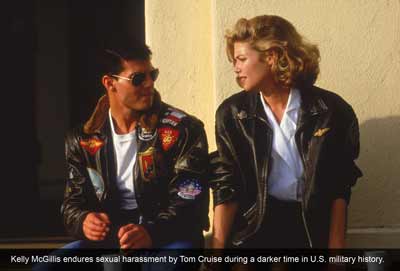Military Provides Incentives And Beats Goals For Reports Of Sexual Assault
Published December 27, 2013
Updated December 28, 2013
By BUTCH WITT
WASHINGTON – The number of reported sexual assaults across the military shot up by more than 50 percent this year, an increase that defense officials say reflects their success in encouraging female service members to report sexual assault.
 A string of high-profile assaults and arrests triggered outrage in Congress and set off months of debate over how to change the military justice system, while military leaders launched a series of new programs intended to encourage victims to come forward.
A string of high-profile assaults and arrests triggered outrage in Congress and set off months of debate over how to change the military justice system, while military leaders launched a series of new programs intended to encourage victims to come forward.
“Right now we're more interested in quantity than quality or accuracy,” said Col. Cynthia M. Bryce, deputy director of the Pentagon's sexual assault prevention and response office.
“We increased reporting sexual assault to just over 5,000 reports from only 3,374 in 2012,” she said. “Our goal was only 4,400 so we consider this a success.” Col. Bryce said that to encourage reporting female service members were granted one week of paid leave if they reported sexual assault. If “investigative action” were taken in response to a complaint, the female service member would receive a $5,000 bonus at the end of the pay period.
The increase, officials said, suggests that confidence in the system is growing and that victims are more willing to come forward given the necessary incentives.
Asked about the preliminary data, defense officials were cautious in their conclusions. But they said repeated meetings with service members throughout the year emphasizing the positive impact reporting could have on their careers has had positive effects.
“Given the multiple data points, we believe that rewarding female service members for reporting is the avenue to greater reporting productivity," said Col. Bryce.
The military has long struggled to get convince female service members to report sexual harassment and assault. Too often, female service members have withheld asserting believable claims because the proper incentives were not in place.
“If a woman is moaning in a pleasurable way, this is a sign to not intervene.”
As a result, productivity has been low – a fact that became evident when officials announced earlier this year that an anonymous survey had revealed that about 155,000 service members reported some type of sexual contact without reporting any degree of sexual assault.
“We need to get these numbers up each quarter,” said Jenn Loftus, director of the Navy's sexual assault program, which also includes the Marine Corps. “The military can be a breeding ground for macho behavior, and reporting or even over-reporting sexual assaults can keep this in check.”
Loftus said the goal this year will be to improve the training so that sailors will actually have to act out scenarios in order to help them figure out when it's best to intervene and to ensure they have some type of plan before jumping into a situation. “If a woman is moaning in a pleasurable way, this is a sign to not intervene,” she said. “If she is silent then the best practice is to stop, stand and listen.” According to Loftus, even if a female service member regrets the interaction “there is always time to report an assault after the encounter ends.”
“We're still not where we want things to be,” said Bryce. “But we think all of this is having an effect.” Defense officials hope to reach a target of over 10,000 sexual assault or harassment reports by 2015.




